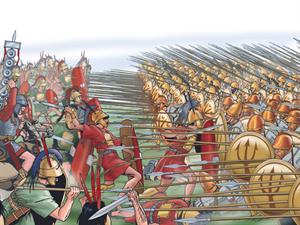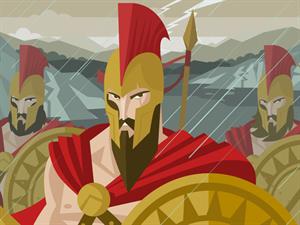PDF chapter test TRY NOW
The Greek vs Persians
The Rise of Greece civilisation and its trade development irked Persia and its ruler, King Darius. He tried to invade the areas and conquer Greece, the conflict between Greece, and the Persians are known as the Persian wars.

The Battle of Greek and Persian Forces
These wars took place under the rule of King Darius of Persia, who ruled it from 550 BC to 486 BC. Darius was expanding his territory by capturing the Mainland of Europe and Macedonia. He set his eyes on Greece to capture the wealth and resources of the Mediterranean shores.
Battle of Marathon: Darius tried twice to take over Greece, where he failed both times. The brave Greek army also thwarted the last attempt he made via sea in Marathon in 490 BC.
Xerxes and the Battle of Thermopylae:
Xerxes, the successor of King Darius, had the same obsession as his predecessor to destroy and capture Greece. In 480 BC, after a decade of failure in the Battle of Marathon, Xerxes invaded Greece via the pass of Thermopylae.

The Spartan Army
The army of Xerxes invaded the land of Greece with the ultimate aim of plundering and taking control of Greek possessions. This time it was the combined force of Greece and Spartans that was awaiting Xerxes.
Spartans: They belong to the warrior class of ancient Greece, whose principle of life was centred around loyalty and military service to the state.
The joint forces of Spartans and the Greeks routed the forces of Xerxes, which made him retreat.
The Final Battle – Battle of Salamis:
The undying spirit of capturing the Greek lands drove the hearts of the Persians, which made them invade Greece via the Gulf of Saroni in Salami. Greeks devised a strong strategy to put the enemy once it for all.
The Persian naval force was moved into the narrow straits of Salami, where they were devoid of chances to escape and were brutally assaulted by the Greek forces, which forced the Persians to bow down.
The Hellenistic Democracy:
The age of City-States emerged under the Athens rule, which the kings ruled, and the positions were hereditary. They also established a new political system called the “Demokratia” which later became “Democracy”.
Democracy combines the Greek words “Demos – meaning people” and “Kratos – meaning power”. It can also be understood as the “rule by the people”. Greece is the “First democracy in the world”.
The developed civilisations of Greece began to expand with trade which made the people richer than the old rulers. They wanted a change among the ruling class where the traders claimed the throne.
